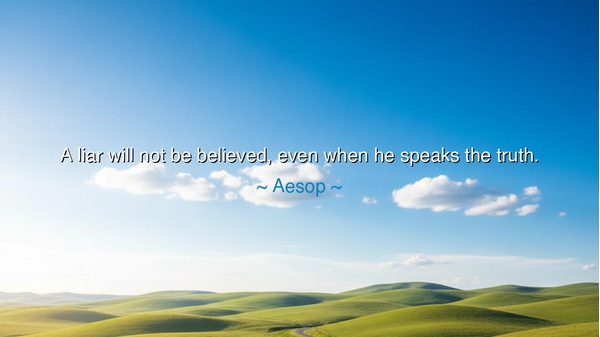
A liar will not be believed, even when he speaks the truth.






Hear the ancient voice of Aesop, the teller of fables, who declared: “A liar will not be believed, even when he speaks the truth.” This wisdom, spoken in simple words, resounds across the ages like the tolling of a bell. For it tells us that trust, once broken, is harder to mend than stone shattered by the hammer. A lie is not merely a falsehood of the moment; it is a poison that seeps into the soul and stains a person’s very name. And when that name is corrupted, even words of truth are cast aside as worthless.
The origin of this teaching lies in Aesop’s most famous tale: “The Boy Who Cried Wolf.” A shepherd boy, seeking amusement, deceived his village by crying out that a wolf was attacking the sheep. Twice he lied, and twice the villagers ran to his aid, only to find no danger. When the wolf finally came for real, he cried out again—but no one believed him. The sheep were devoured, and his cries were lost in the wind. Thus the fable endures: a liar destroys his own credibility, and even truth, when it leaves his lips, carries the scent of deceit.
This story is not only for children but for nations. Consider the fall of Richard Nixon, caught in the coils of the Watergate scandal. His deceptions, his denials, his cover-ups—each one gnawed at the public’s trust until his words, even when partly true, were doubted by all. The people could no longer distinguish between his truth and his lies, for his character had already been marked by falsehood. In the end, it was not only his office that fell, but his honor, for he had proven Aesop right: once a man is known as a liar, even truth is powerless on his tongue.
The ancients also feared this destruction of trust. To the Greeks and Romans, a man’s word was sacred; to break it was to dishonor not only himself but the order of society. For communities are built not upon weapons nor wealth, but upon trust. Lies corrode that trust like rust upon iron, until the chain that binds people together crumbles. This is why Aesop’s wisdom is eternal: the liar does not only wound others; he wounds the very foundation of his own life.
We must see too that this teaching is not merely about public figures but about the soul of every person. A friend who lies once may be forgiven; a friend who lies often will be doubted forever. A parent who deceives their child, or a child who deceives their parent, plants seeds of mistrust that may grow into bitterness. And when the moment comes when truth is most needed, when the cry of “wolf” is real, it will not be heard. This is the punishment of falsehood: that even when you long to be believed, your voice is empty.
The lesson is clear and weighty: guard your honesty as you would guard treasure, for once it is lost, no riches can buy it back. Speak truth always, not only when convenient, lest your tongue become branded with suspicion. If you stumble and lie, confess quickly, lest the stain grow deeper. For trust is built slowly, like the laying of stones, but destroyed in an instant, like a wall struck by lightning.
Therefore, O child of tomorrow, remember Aesop’s warning: a liar will not be believed, even when he speaks the truth. Do not live so that your words are doubted. Let your speech be a mirror of reality, clear and faithful. Let your life be consistent, so that others know you by your truthfulness. For when truth is upon your lips, it must be trusted, else it is as useless as a cry in the wilderness. Live so that when you speak, others listen—and when you cry for help, they will come.






LTLien Thu
I find this quote interesting because it suggests that dishonesty creates a lasting impact on our ability to be trusted. It’s almost as if the liar’s words become tainted with doubt. Do you think people tend to jump to conclusions about others based on past actions, or can we judge each statement on its own merit? How can we navigate situations where someone’s past dishonesty prevents us from trusting their current truth?
NQNhu Quynh
Aesop’s wisdom reflects how deeply intertwined truth and trust are. If someone constantly lies, even their truthful statements will be met with skepticism. But can there be situations where someone who lies for the greater good could still be trusted? How do we differentiate between someone who has earned the benefit of the doubt and someone whose credibility is lost for good?
Hhan
This quote really makes me think about how easily trust can be broken. If someone lies repeatedly, even the truth they speak will be doubted. It’s interesting to consider how much damage a single lie can cause. Do you think that the truth, when spoken by someone with a reputation for dishonesty, is ever fully trusted? How do we ensure that our actions align with our words to maintain credibility?
LQLe Quynh
Aesop’s quote highlights a significant issue about trust and credibility. Once someone is known to lie, it becomes difficult to believe them, even when they’re being honest. Do you think it’s possible to rebuild trust after a history of dishonesty? How much does the past affect the way we perceive someone’s truthfulness? Can a person ever truly regain credibility, or is the damage permanent?